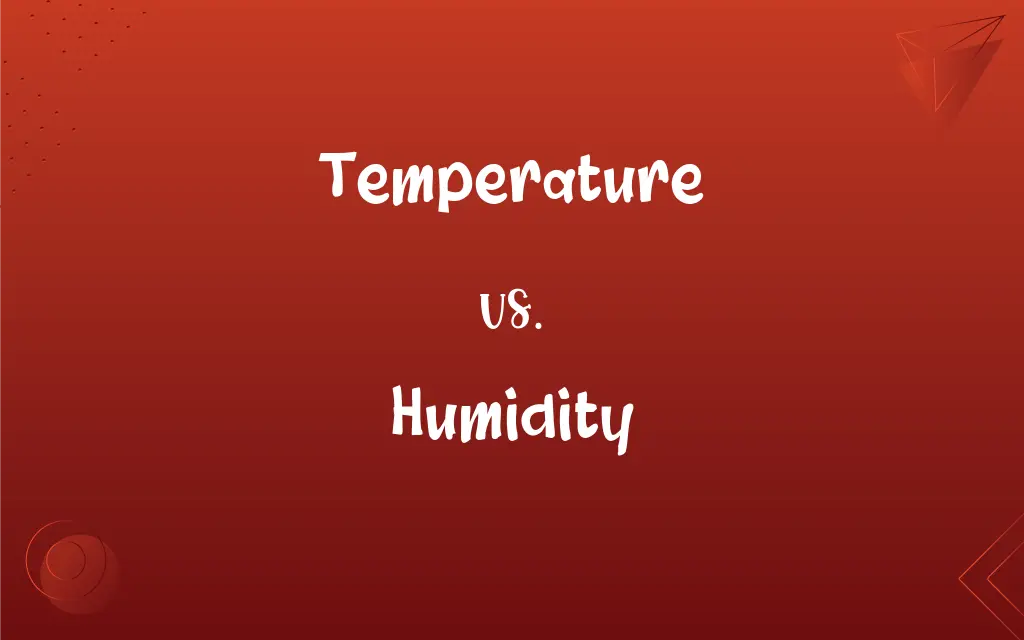Temperature vs. Humidity: What's the Difference?
Edited by Harlon Moss || By Janet White || Published on December 16, 2023
Temperature measures the degree of heat, indicating how hot or cold something is, while humidity refers to the amount of water vapor in the air.

Key Differences
Temperature is a physical quantity expressing the degree of heat or cold in an environment, measured in degrees (Celsius, Fahrenheit). Humidity, on the other hand, measures the concentration of water vapor present in the air, expressed as a percentage.
High temperatures can affect the comfort level, physical health, and energy usage, whereas high humidity levels can cause discomfort, mold growth, and affect health.
Temperature is sensed by the human body through skin and perceived as heat or cold. Humidity is felt as the degree of moisture in the air and influences how we perceive temperature.
Thermometers are used to measure temperature, utilizing materials that expand or contract with heat. Hygrometers measure humidity, assessing the moisture content of the air.
Temperature significantly influences weather patterns and climate zones, whereas humidity plays a critical role in precipitation, cloud formation, and overall climate.
ADVERTISEMENT
Comparison Chart
Definition
Measure of heat or coldness
Measure of water vapor in the air
Units of Measurement
Degrees Celsius, Fahrenheit
Percentage (%)
Sensory Perception
Perceived as heat or cold by the skin
Felt as moisture in the air
Measurement Device
Thermometer
Hygrometer
Environmental Impact
Affects comfort, energy usage
Influences discomfort, mold growth, health
ADVERTISEMENT
Temperature and Humidity Definitions
Temperature
A measure of the degree of heat in an environment.
The temperature today reached 30 degrees Celsius.
Humidity
The concentration of water vapor present in the air.
The humidity level today is unusually high.
Temperature
An indicator of the kinetic energy of particles in a substance.
The temperature of boiling water is 100 degrees Celsius.
Humidity
A key factor in determining the comfort level of an environment.
High humidity makes the heat feel more oppressive.
Temperature
A variable controlled in various scientific experiments.
We maintained a constant temperature in the incubator.
Humidity
Measured as a percentage of moisture in the air.
The humidity in the rainforest can reach 90%.
Temperature
A factor determining the state of matter (solid, liquid, gas).
The temperature drop caused the water to freeze.
Humidity
Influential in weather patterns and precipitation.
Increased humidity often precedes rainfall.
Temperature
A critical parameter in weather forecasting.
The temperature is expected to rise this weekend.
Humidity
A variable affecting indoor air quality.
We use a dehumidifier to reduce humidity in the basement.
Temperature
The degree of hotness or coldness of a body or environment.
Humidity
Dampness, especially of the air.
Temperature
A measure of the average kinetic energy of the particles in a sample of matter, expressed in terms of units or degrees designated on a standard scale.
Humidity
Relative humidity.
Humidity
Dampness, especially that of the air.
Humidity
The amount of water vapour in the air.
Humidity
Moisture; dampness; a moderate degree of wetness, which is perceptible to the eye or touch; - used especially of the atmosphere, or of anything which has absorbed moisture from the atmosphere, as clothing.
Humidity
The content of water vapor in the air, expressed as a percent of the maximum amount of water vapor that the air can hold at the given temperature; also called relative humidity. The capacity of the air to hold moisture increases with temperature, so if the temperature changes without changing the absolute content of the atmospheric moisture, the relative humidity will also change.
Humidity
Wetness in the atmosphere
FAQs
What is temperature?
A measure of how hot or cold something is.
Can temperature affect humidity?
Yes, higher temperatures can hold more moisture, affecting humidity.
What device measures humidity?
A hygrometer.
Why is temperature important in weather forecasts?
It helps predict weather conditions and temperatures.
What does humidity indicate?
The amount of water vapor in the air.
How do we measure temperature?
With a thermometer.
In what unit is humidity measured?
As a percentage (%).
How does humidity impact weather?
It influences cloud formation and precipitation.
Does humidity influence temperature perception?
Yes, high humidity can make it feel hotter.
What unit is temperature measured in?
Degrees Celsius or Fahrenheit.
What is a comfortable indoor humidity level?
Between 30% and 50%.
How does body temperature relate to health?
Normal body temperature indicates health; deviations can signal illness.
Why is controlling humidity important in buildings?
To prevent mold growth and maintain comfort.
Is humidity a factor in heat index calculations?
Yes, it's combined with temperature to assess how hot it feels.
Can humidity affect health?
Yes, extreme humidity levels can impact respiratory health.
What's a comfortable temperature range for homes?
Typically between 68°F and 72°F (20°C to 22°C).
Can outdoor temperature affect indoor humidity?
Yes, outdoor temperatures can influence indoor humidity levels.
Do temperature and humidity affect food preservation?
Yes, they can influence food spoilage rates.
What role does temperature play in climate change?
Rising global temperatures are a key indicator of climate change.
What's the relationship between temperature and energy usage?
Higher or lower temperatures can increase heating or cooling energy use.
About Author
Written by
Janet WhiteJanet White has been an esteemed writer and blogger for Difference Wiki. Holding a Master's degree in Science and Medical Journalism from the prestigious Boston University, she has consistently demonstrated her expertise and passion for her field. When she's not immersed in her work, Janet relishes her time exercising, delving into a good book, and cherishing moments with friends and family.
Edited by
Harlon MossHarlon is a seasoned quality moderator and accomplished content writer for Difference Wiki. An alumnus of the prestigious University of California, he earned his degree in Computer Science. Leveraging his academic background, Harlon brings a meticulous and informed perspective to his work, ensuring content accuracy and excellence.






































































